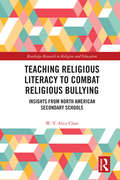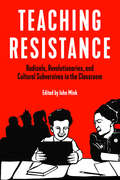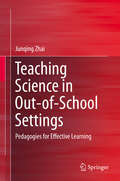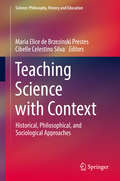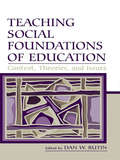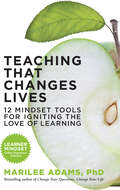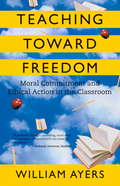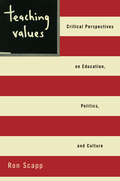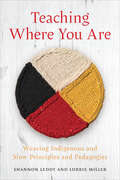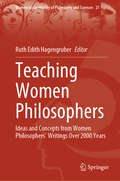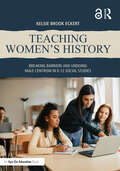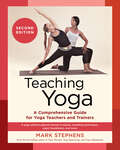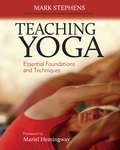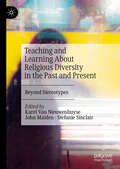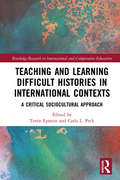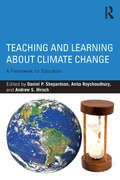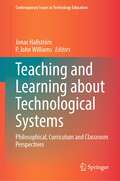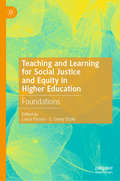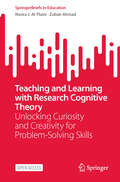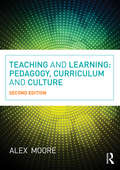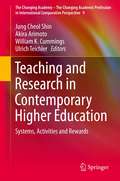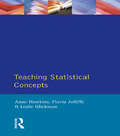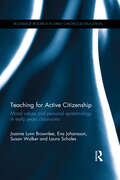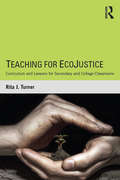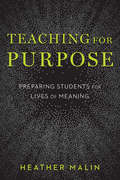- Table View
- List View
Teaching Religious Literacy to Combat Religious Bullying: Insights from North American Secondary Schools (Routledge Research in Religion and Education)
by W. Y. ChanThis text explores the phenomenon of religious bullying as it manifests in two North American contexts and theorizes religious literacy as a viable school-based intervention to promote understanding of religious and non-religious difference. Using substantive, qualitative data from schools and communities in California and Quebec, Teaching Religious Literacy to Combat Religious Bullying examines the impact of mandatory religious literacy courses delivered in secondary schools and identifies curricula, teacher attitudes, training, and administrative support as key determinants of course impact. Drawing on Bronfenbrenner’s social-ecological framework, the text then illustrates how the environmental factors both in and outside of the school considerably influence teacher and student attitudes to religious and non-religious traditions. Practical recommendations are made to combat overarching societal trends and religious discrimination within the classroom, and context is cited as key to an effective discussion on religious literacy more broadly. This text will benefit researchers, academics, and educators with an interest in religious literacy, religious education, the sociology of education, and those looking at the field of bullying and truancy more widely. Those interested in intersectionality, marginalized communities, secularism, and educational policy will also benefit from the volume.
Teaching Resistance: Radicals, Revolutionaries, and Cultural Subversives in the Classroom
by John MinkTeaching Resistance is a collection of the voices of activist educators from around the world who engage inside and outside the classroom from pre-kindergarten to university and emphasize teaching radical practice from the field. Written in accessible language, this book is for anyone who wants to explore new ways to subvert educational systems and institutions, transform educational spaces, and empower students and teachers to fight for genuine change. Topics include community self-defense, Black Lives Matter and critical race theory, intersections between punk/DIY subculture and teaching, ESL, anarchist education, Palestinian resistance, trauma, working-class education, prison teaching, the resurgence of (and resistance to) the Far Right, special education, antifascist pedagogies, and more. Edited by social studies teacher, author, and punk musician John Mink, the book features expanded entries from the monthly column in the politically insurgent punk magazine Maximum Rocknroll, plus new works and interviews with subversive educators. Contributing teachers include Michelle Cruz Gonzales, Dwayne Dixon, Martín Sorrondeguy, Alice Bag, Miriam Klein Stahl, Ron Scapp, Kadijah Means, Mimi Nguyen, Murad Tamini, Yvette Felarca, Jessica Mills, and others.
Teaching Science in Out-of-School Settings
by Junqing ZhaiThis book explores pedagogical approaches used by informal science educators and botanic garden educators in particular, when teaching science to visiting students (7-12 years old). More specifically, it draws on the sociocultural perspective of learning, and highlights the importance of discourse in learning processes. It examines the interactions between four botanic garden educators (BGEs) and their students, focusing on how the students' contributions to the talk are followed up on by the BGEs. Moreover, it includes an investigation into which kinds of teaching behaviours on the part of BGEs can best support learning.
Teaching Science with Context: Historical, Philosophical, and Sociological Approaches (Science: Philosophy, History and Education)
by Maria Elice Prestes Cibelle Celestino SilvaThis book offers a comprehensive overview of research at interface between History, Philosophy and Sociology of Science (HPSS) and Science Teaching in Ibero-America. It contributes to research on contextualization of science for students, teachers and researchers, and explains how to use different episodes of history of science or different themes of philosophy of science in regular science classes through diverse pedagogical approaches.The chapters in this book discuss a wide range of topics under different methodological, epistemological and didactic approaches, reflecting the richness of research developed in Spanish and Portuguese speaking countries, Latin America, Spain and Portugal. The book contains chapters about historical events, topics of philosophy and sociology of science, nature of science, applications of HPSS in the classroom, instructional materials for students and teacher training courses and curriculum.
Teaching Social Foundations of Education: Contexts, Theories, and Issues (Sociocultural, Political, and Historical Studies in Education)
by Dan W. ButinThis book, the first comprehensive, critical examination of the theory and pedagogy of the field of social foundations of education and its relevance and role within teacher education:*Articulates central questions in the field--such as "What is social foundations?"; "Is there a social foundations canon?"; "Is it possible to teach for social justice?"; "What is student resistance?";*Explores the limits and possibilities of teaching social foundations of education;*Provides strong arguments for the continued relevance of the discipline for teacher education;*Features a variety of clearly presented, theoretically grounded models for teaching social foundations within teacher education programs--including aesthetic education, critical theory, and eco-justice perspectives, the use of community-based oral histories, and experiential learning activities;*Provides concrete examples, actual syllabi, and a host of additional resources to help faculty teach, publish, and do research; and*Proposes new directions for research and dialogue within the field.This volume is an ideal entrance into the field for graduate students, junior faculty, and professors from other areas of education who are teaching in the social foundations field for the first time.
Teaching That Changes Lives: 12 Mindset Tools for Igniting the Love of Learning
by Marilee G. AdamsBuilding on the success of her classic, bestselling book, Change Your Questions, Change Your Life, Marilee Adams shows how, by adopting a new mindset, teachers can rekindle their love of teaching and ignite their students with a love of learning.Teaching That Changes Lives is a transformational and practical guide that will enable teachers to make an authentic difference with their students and avoid succumbing to the myriad pressures and challenges of their jobs. Using the storytelling format that proved so successful in her previous book, Adams tells how Emma, a sixth-grade teacher on the verge of quitting her job, learns to cultivate what Adams calls the “Learner Mindset”— having the discipline, curiosity, and courage to consistently ask growth-oriented, open-minded questions of oneself and others—and to avoid the close-minded and critical “Judger Mindset.” Emma transforms her classroom, her relationships with her colleagues, and, most importantly, her students' eagerness for learning and achievement. Teaching is more than imparting facts and skills—it's preparing students for the test of life. Featuring an innovative, easy-to-follow workbook and access to a Learner Mindset online mini-course, this inspiring book will ensure that teachers and students alike become creative, resilient problem solvers, bridge builders, and lifelong learners.
Teaching Toward Freedom: Moral Commitment and Ethical Action in the Classroom
by William AyersAyers (education, U. of Illinois at Chicago), who has taught for 30 years, feels that teachers are "moral actors," that teaching involves "moral commitment and ethical action," and that these elements are at the core of real education. He advises teachers to accept their calls as instigators of freedom and enlightenment, and act as coworkers with students. Using examples from the academe, including poetry, history, and fiction, as well as popular culture, he examines what can go right, and wrong, and how teachers can be liberators or tyrants, depending on how they perceive their core missions and on how well they understand their students as individuals. Ayers includes neither a bibliography nor an index. Annotation ©2004 Book News, Inc. , Portland, OR (booknews. com)
Teaching Values: Critical Perspectives on Education, Politics, and Culture
by Ron ScappIn Teaching Values, Ron Scapp wrests the discussion of values and values-based education away from traditionalists who have long dominated educational debates. While challenging the Right's domination of the discussion of values education, Scapp examines some issues not typically raised by educators and critics on the Left, including the positive role of citizenship and national identity in U.S. education and culture.
Teaching Where You Are: Weaving Indigenous and Slow Principles and Pedagogies
by Lorrie Miller Shannon LeddyTeaching Where You Are offers a guide for non-Indigenous educators to work in good ways with Indigenous students and provides resources across curricular areas to support all students. In this book, two seasoned educators, one Indigenous and one settler, bring to bear their years of experience teaching in elementary, secondary, and post-secondary contexts to explore the ways in which Indigenous and Slow approaches to teaching and learning mirror and complement one another. Using the holistic framework of the Medicine Wheel, Shannon Leddy and Lorrie Miller illustrate the ways in which interdisciplinary thinking, a focus on experiential learning, and the thoughtful application of the 4Rs – Respect, Relevance, Reciprocity, and Responsibility – can bring us back to the principle of teaching people, not subjects. Bringing forth the ways in which colonialism and cognitive imperialism have shaped Canadian curriculum and consciousness, the book offers avenues for the development of decolonial literacy to support the work of Indigenizing education. In considering the importance of engaging in decolonizing and Indigenizing approaches to education through Slow and Indigenous pedagogies using the lens of place-based and land-based education, Teaching Where You Are presents a text useful for teachers and educators grappling with the ongoing impacts of colonialism and the soul-work of how to decolonize and rehumanize education in meaningful ways.
Teaching Women Philosophers: Ideas and Concepts from Women Philosophers’ Writings Over 2000 Years (Women in the History of Philosophy and Sciences #21)
by Ruth Edith HagengruberThis book expands the known canon by presenting arguments and concepts from women philosophers, from all periods of the history of philosophy, from antiquity to the present day. The collaborative collection is an undertaking that emerged from intensive discussions on how to expand the philosophical canon, which formed the conclusion of the Libori Summer School 2019. This Libori Summer School, the third in a row, was held to enhance the study of texts written by women philosophers from Antiquity up to now and intended to give opportunity to young scholars to connect and to build networks. Presenting such a collection is even more urgent today because a diversification of the canon has long been called for. Nevertheless, to date there is little explicit material available for this purpose. To make this book suitable for both academics and students, it is structured in such a way that readers can use excerpts and individual chapters from it that suit their needs, be it in moral philosophy, politics, or phenomenology, etc. Containing chapters on women such as Suor Juana, Emilie Du Châtelet, and Nisia Floresta and supplemented by contextualization, namely by some brief biographical information and by the systematic integration of her argument into the debates of the respective periods, this book is an important resource highlighting the achievements and value of women in philosophy and calling for a further diversification of the canon.
Teaching Women's History: Breaking Barriers and Undoing Male Centrism in K-12 Social Studies
by Kelsie Brook EckertTeaching Women’s History: Breaking Barriers and Undoing Male Centrism in K-12 Social Studies challenges and guides K-12 history teachers to incorporate comprehensive and diverse women’s history into every region and era of their history curriculum.Providing a wealth of practical examples, ideas, and lesson plans – all backed by scholarly research – for secondary and middle school classes, this book demonstrates how teachers can weave women’s history into their curriculum today. It breaks down how history is taught currently, how teachers are prepared, and what expectations are set in state standards and textbooks and then shows how teachers can use pedagogical approaches to better incorporate women’s voices into each of these realms. Each chapter explores a major barrier to teaching an inclusive history and how to overcome it, and every chapter ends with an inquiry-based lesson plan on women or using women's sources which stands counter to the way curriculum is traditionally taught, a case in point that tasks readers to realize how women have been integral to every period of history.With expert guidance from an award-winning social studies teacher, this guidebook will be important reading for middle and high school history educators. It will also be beneficial to preservice teachers, particularly within Social Studies Education and Gender Studies.Additional resources for educators are available to view at www.remedialherstory.com.
Teaching Yoga, Second Edition: A Comprehensive Guide for Yoga Teachers and Trainers: A Yoga Alliance-Aligned Manual of Asanas, Breathing Techniques, Yogic Foundations, and More
by Mark StephensThe bestselling guide for yoga teachers and trainers, revised and updated—a comprehensive Yoga Alliance-aligned manual of asanas, breathing techniques, yogic foundations, and more.Revised and updated, Teaching Yoga by yoga expert Mark Stephens is one of the most popular resources for new and experienced teachers, and has been a trusted guide since its publication in 2010.This classic resource covers fundamental topics of yoga history and philosophy, as well as each of the 11 major styles of contemporary yoga. There is also practical advice for every stage of the teaching process, including tools for teaching 108 yoga poses (asanas), breathing techniques (pranayama), and meditation.The 2nd edition—adapted to meet the needs of the modern yoga teacher—features:Updated sections on yoga history and philosophyDiscussions of trauma-sensitive yogaCoverage of cultural appropriation, racism, and sexism in yoga An inclusive approach that expands beyond the traditional vinyasa flow styleNew photos and illustrations1-page summaries after each chapterAn extended list of references for further learningDeveloped to meet 100% of the teacher training curriculum standards set by Yoga Alliance, the world&’s leading registry and accreditation source for yoga teachers and schools, Teaching Yoga is ideal for use as a core textbook in yoga teacher training programs.
Teaching Yoga: Essential Foundations and Techniques
by Mariel Hemingway Mark StephensTeaching Yoga is an essential resource for new and experienced teachers as well as a guide for all yoga students interested in refining their skills and knowledge. Addressing 100% of the teacher training curriculum standards set by Yoga Alliance, the world's leading registry and accreditation source for yoga teachers and schools, Teaching Yoga is also ideal for use as a core textbook in yoga teacher training programs. Drawing on a wide spectrum of perspectives, and featuring more than 150 photographs and illustrations, the book covers fundamental topics of yoga philosophy and history, including a historical presentation of classical yoga literature: the Vedas, Upanishads, Bhagavad Gita, Yoga Sutras of Pataljali, and the main historical sources on tantra and early hatha yoga. Each of the eleven major styles of contemporary yoga is described, with a brief history of its development and the distinguishing elements of its teachings. Exploring traditional and modern aspects of anatomy and physiology, the book provides extensive support and tools for teaching 108 yoga poses (asanas), breathing techniques (pranayama), and meditation. Teaching Yoga offers practical advice for classroom setup, planning and sequencing classes, as well as the process involved in becoming a teacher and sustaining oneself in the profession. The book has over 200 bibliographic sources, a comprehensive index, and a useful appendix that lists associations, institutes, organizations, and professional resources for yoga teachers.From the Trade Paperback edition.
Teaching and Learning About Religious Diversity in the Past and Present: Beyond Stereotypes
by John Maiden Karel Van Nieuwenhuyse Stefanie SinclairThis edited book explores examples of different ways in which societies and individuals have dealt with the concepts of religious diversity, toleration and peace-making in politics and law, and how these examples can inform educators and learners in (in- and non-)formal education today. Chapters introduce and analyse nine key documents: the Capitulations of Granada (1492), the Confederation of Warsaw (1573), the Peace of Westphalia (1648), the Royal Charter of Rhode Island (1663), the Declaration of the Rights of Man and of the Citizen (1789), the European Convention of Human Rights (1950), the Belfast/ Good Friday Agreement (1998), the Ohrid Framework Agreement (2001) and the Mardin Declaration (2010). In addition to explaining how each document manages toleration and peace, the authors also provide ‘clippings’, short visual and textual excerpts relating to the document under discussion. These aim to challenge thinking about the historical document and its potential significance for the present. The book’s contributors consider the past as a source of inspiration for learning in formal and informal educational contexts such as classrooms, museums and youth work. It will be of interest to teachers and scholars in history, citizenship, philosophy, ethics and religious education in schools and beyond.
Teaching and Learning Difficult Histories in International Contexts: A Critical Sociocultural Approach (Routledge Research in International and Comparative Education)
by Terrie Epstein Carla L. PeckGrounded in a critical sociocultural approach, this volume examines issues associated with teaching and learning difficult histories in international contexts. Defined as representations of past violence and oppression, difficult histories are contested and can evoke emotional, often painful, responses in the present. Teaching and learning these histories is contentious yet necessary for increased dialogue within conflict-ridden societies, reconciliation in post-conflict societies, and greater social cohesion in long-standing democratic nations. Focusing on locations and populations across the globe, chapter authors investigate how key themes—including culture, identity, collective memory, emotion, and multi-perspectivity, historical consciousness, distance, and amnesia—inform the teaching and learning of difficult histories.
Teaching and Learning about Climate Change: A Framework for Educators
by Daniel P. Shepardson, Anita Roychoudhury and Andrew S. HirschResponding to the issues and challenges of teaching and learning about climate change from a science education-based perspective, this book is designed to serve as an aid for educators as they strive to incorporate the topic into their classes. The unique discussion of these issues is drawn from the perspectives of leading and international scholars in the field. The book is structured around three themes: theoretical, philosophical, and conceptual frameworks for climate change education and research; research on teaching and learning about global warming and climate change; and approaches to professional development and classroom practice.
Teaching and Learning about Technological Systems: Philosophical, Curriculum and Classroom Perspectives (Contemporary Issues in Technology Education)
by P. John Williams Jonas HallströmThis book discusses the teaching and learning about technological systems in technology education and adjacent curriculum areas. It describes, analyzes and synthesizes contemporary research on technological systems in technology education. By delving into the philosophy, sociology and history of technology, technology education and the learning and teaching of technological systems, it summarizes prior research and analyzes new research. This book thereby serves as a resource and reference work for professionals in this area of research and education.
Teaching and Learning for Social Justice and Equity in Higher Education: Foundations
by Laura Parson C. Casey OzakiThis book is the first of three edited volumes designed to reconceptualize teaching and learning in higher education through a critical lens, with this inaugural publication focusing on the fundamentals behind the experience. Chapter authors explore recent research on the cognitive science behind teaching and learning, dispel myths on the process, and provide updates to the application of traditional learning theories within the modern, diverse university. Through reviews of fundamental theories of teaching and learning, together with specific classroom practices, this volume applies social justice principles that have been traditionally seen as belonging to K-12 or adult education to higher education.
Teaching and Learning with Research Cognitive Theory: Unlocking Curiosity and Creativity for Problem-Solving Skills (SpringerBriefs in Education)
by Zubair Ahmad Noora J. Al-ThaniThis open access volume explores the transformative role of Research Cognitive Theory (RCT) in education, emphasizing its application in fostering curiosity, creativity, innovation, problem-solving skills, and cognitive development across all educational levels in students and professional development in teachers. Through detailed discussions on integrating research-based learning with STEM education, the book offers practical insights for educators, researchers, and policymakers aiming to enhance teaching methodologies and student outcomes. By bridging the gap between theory and practice, this work serves as a vital resource for those seeking to cultivate inquiry-driven learning environments. Readers benefit from actionable strategies, case studies, and a comprehensive understanding of how RCT can revolutionize modern education.
Teaching and Learning: Pedagogy, Curriculum and Culture (Itt Ser.)
by Alex MooreTeaching and Learning: Pedagogy, Curriculum and Culture is designed to share important theory with readers in an accessible but sophisticated way. It offers an overview of the key issues and dominant theories of teaching and learning as they impact upon the practice of education professionals in the classroom. This second edition has been updated to take account of significant changes in the field; young people’s use of digital technologies, the increasing involvement of world of business in state education, and ongoing high-profile debates about assessment, to name but a few. It examines the global move from traditional subject-and-knowledge based curricula towards skills and problem-solving and discusses how the emphasis on education for citizenship has forced us to reconsider the social functions of education. Central topics also covered include: an assessment of the most influential theorists of learning and teaching the ways in which public educational policy impinges on local practice the nature and role of language and culture in formal educational settings an assessment of different models of 'good teaching' alternative models of curriculum and pedagogy. With questions, points for consideration and ideas for further reading and research throughout, this book delivers discussion and analysis designed to support understanding of classroom interactions and to contribute to improved practice. It will be essential reading for all student teachers, those engaged in professional development, and Education Studies students.
Teaching and Research in Contemporary Higher Education: Systems, Activities and Rewards
by William K. Cummings Ulrich Teichler Jung Cheol Shin Akira ArimotoThis book discusses how teaching and research have been weighted differently in academia in 18 countries and one region, Hong Kong SAR, based on an international comparative study entitled the Changing Academic Profession (CAP). It addresses these issues using empirical evidence, the CAP data. Specifically, the focus is on how teaching and research are defined in each higher education system, how teaching and research are preferred and conducted by academics, and how academics are rewarded by their institution. Since the establishment of Berlin University in 1810, there has been controversy on teaching and research as the primary functions of universities and academics. The controversy increased when Johns Hopkins University was established in 1876 with only graduate programs, and more recently with the release of the Carnegie Foundation report Scholarship Reconsidered by Ernest L. Boyer in 1990. Since the publication of Scholarship Reconsidered in 1990, higher education scholars and policymakers began to pay attention to the details of teaching and research activities, a kind of 'black box' because only individual academics know how they conduct teaching and research in their own contexts.
Teaching as Communication (Effective Teacher, The)
by Bob HodgeGood teaching relies on a firm grasp of the communication process. In this innovative text Bob Hodge presents common pitfalls in the communication of teachers, and shows where they are most likely to mistake the communication of pupils. He uses practical examples which enable the reader to see an immediate and direct connection with classroom practises, making principles easier to understand and apply.
Teaching for Active Citizenship: Moral values and personal epistemology in early years classrooms (Routledge Research in Early Childhood Education)
by Eva Johansson Laura Scholes Joanne Lunn Brownlee Susan WalkerThere is strong social and political interest in active citizenship and values in education internationally. Active citizenship requires children to experience and internalize moral values for human rights, developing their own opinions and moral responsibility. While investment in young children is recognised as an important factor in the development of citizenship for a cohesive society, less is known about how early years teachers can encourage this in the classroom. This book will present new directions on how teachers can promote children's learning of moral values for citizenship in classrooms. The research provided offers important insights into teaching for active citizenship by: • providing an analysis of educational contexts for moral values for active citizenship • highlighting teachers’ beliefs about knowing and knowledge (personal epistemologies) and how these relate to children’s learning and understanding about social and moral values • discussing the impact of teachers’ beliefs on teaching practices. Evidence suggests that investment in the early years is vital for all learning, and specifically for developing an understanding of active citizenship for tolerant and cohesive societies. This book will be essential reading for the professional education of early years teachers interested in teaching for active citizenship.
Teaching for EcoJustice: Curriculum and Lessons for Secondary and College Classrooms
by Rita J. TurnerTeaching for EcoJustice is a unique resource for exploring the social roots of environmental problems in humanities-based educational settings and a curriculum guidebook for putting EcoJustice Education into practice. It provides model curriculum materials that apply the principles of EcoJustice Education, giving pre- and in-service teachers the ability to review examples of specific secondary and post-secondary classroom assignments, lessons, discussion prompts, and strategies that encourage students to think critically about how modern problems of sustainability and environmental destruction have developed, their root causes, and how they can be addressed. The author describes instructional methods she uses when teaching each lesson and shares insights from evaluations of the materials in her classroom and by other teachers. Interspersed between lessons is commentary about the rationale behind the materials and observations about their effect on students.
Teaching for Purpose: Preparing Students for Lives of Meaning
by Heather MalinIn Teaching for Purpose, Heather Malin explores the idea of purpose as the purpose of education and shows how educators can prepare youth to live intentional, fulfilling lives. The book highlights the important role that purpose—defined as &“a future-directed goal that is personally meaningful and aimed at contributing to something larger than the self&”—plays in optimal youth development and in motivating students to promote the cognitive and noncognitive skills that teachers want to instill. Based on a decade of research conducted at the Stanford University Center on Adolescence, the book explores how educators and schools can promote purpose through attention to school culture, curriculum, project learning, service learning, and other opportunities. Malin argues for expansive thinking on the direction schools should take, especially in terms of educating students to be creative, innovative, and self-directed critical thinkers. The book includes profiles of six organizations working in schools across the US that have made purpose development a priority. Infused with the engaging voices of purposeful youth, Teaching for Purpose offers a fresh, inspirational guide for educators who are looking for new ways to support students to succeed not only in school, but in life.
